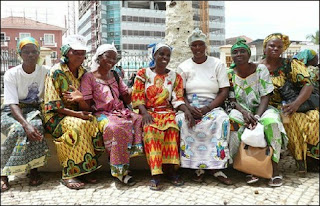Back to Main Page
Personal Appearance
Urban Angolans generally wear Western clothing. They like to dress well when going out, even if only for everyday tasks such as shopping. Older urban men may wear a two-piece suit on formal occasions. Among younger businessmen, a three-piece suit and tie is the norm. It is still common for women, especially in rural areas, to wear a blouse, an African-style wraparound dress, and a colorful shawl tied around the neck or head. A shawl may also be wrapped around the back to carry a child. Young urban women often prefer jeans or other casual Western clothing. In rural communities, if people have nice clothes, they prefer to reserve them for the most important events, such as a wedding or church service. Traditional clothing still exists among some ethnic groups. For example, Mumuilas women in southern Angola wear elaborate beadwork and bracelets on their neck, arms, and legs.Greetings
Female friends and friends of the opposite sex greet by kissing one another once on each cheek. Good male friends may greet with a brief hug and several slaps on the back. Otherwise, people shake hands. Portuguese greetings include Bom dia, como está? (Good day, how are you?) and the informal Oi or Olá (both meaning “Hi”). A young man might say to another Meu camba, fixe? (Friend, are you okay?). A common Umbundo greeting is Walale (meaning “Good morning,” but literally translated as “How did you pass the night?”). The reply is generally Ndalale (I passed the night well, and you?). One addresses an elderly man with a respectful term such as Kota (Elder) or Tio (Uncle), even when no family relationship exists. An elderly woman is called Mãe or Mamá (Mother) or Tia (Aunt). In formal situations, the Portuguese titles Senhor (Mr.) or Senhora (Mrs.) precede the person’s last name. When people part, they might say Boa continuação (Have a nice day), Feliz noite (Good night), or the informal Tcháu (Good-bye).Gestures
Holding the hand flat and pointing the index finger of the other hand into the palm means “I want to speak to you.” Pointing an index finger at someone can be interpreted as aggression. Giving the “thumbs up” is a common way to say “Everything is okay!” If a person is busy talking with someone but wishes to greet another person, the greeter lifts the palm of the hand. The other person will reply with the same gesture. Public displays of affection between people of the opposite sex are discouraged, especially in rural areas. As a sign of friendship, friends of the same sex may hold hands. It is not uncommon, or considered rude, for people to spit, pick their nose, or scratch their body in public.



 |
| Albino baby girl and her Mwila |
South Africa
Re: Pictures Of African Traditional Clothing!
Ethiopia
Re: Pictures Of African Traditional Clothing!
Ghana
Re: Pictures Of African Traditional Clothing!
Sierra Leone
Re: Pictures Of African Traditional Clothing!
Ivory Coast
Re: Pictures Of African Traditional Clothing!
Gabon
Re: Pictures Of African Traditional Clothing!
Zambia
Re: Pictures Of African Traditional Clothing!
Namibia
Re: Pictures Of African Traditional Clothing!
senegal
Re: Pictures Of African Traditional Clothing!
Mali
Re: Pictures Of African Traditional Clothing!
Djibouti
Re: Pictures Of African Traditional Clothing!
togo
Re: Pictures Of African Traditional Clothing!
Benin.
Re: Pictures Of African Traditional Clothing!
Uganda
Re: Pictures Of African Traditional Clothing!
Somalia
Re: Pictures Of African Traditional Clothing!
angola
Re: Pictures Of African Traditional Clothing!
Algeria
Re: Pictures Of African Traditional Clothing!
cameroon
Re: Pictures Of African Traditional Clothing!
libya
Re: Pictures Of African Traditional Clothing!
congo
Re: Pictures Of African Traditional Clothing!
Guinée Conakry
Re: Pictures Of African Traditional Clothing!
morocco
Re: Pictures Of African Traditional Clothing!
mauritania
Re: Pictures Of African Traditional Clothing!
Touaregs of Niger
Re: Pictures Of African Traditional Clothing!
Northern Sudan

















